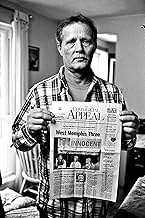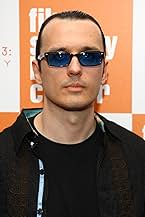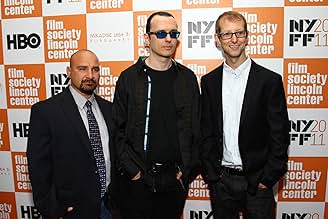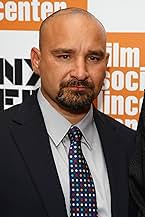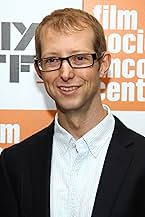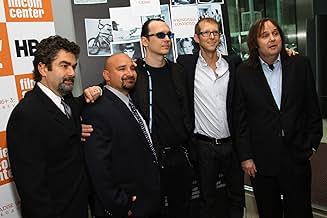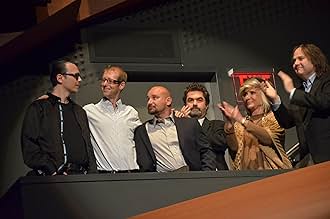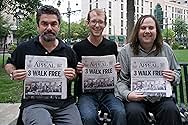अपनी भाषा में प्लॉट जोड़ेंA further followup of the case of the West Memphis Three and the decades long fight to exonerate them that finally gained traction with new DNA evidence.A further followup of the case of the West Memphis Three and the decades long fight to exonerate them that finally gained traction with new DNA evidence.A further followup of the case of the West Memphis Three and the decades long fight to exonerate them that finally gained traction with new DNA evidence.
- 1 ऑस्कर के लिए नामांकित
- 5 जीत और कुल 6 नामांकन
- Self - Parent of Michael Moore
- (आर्काइव फ़ूटेज)
- Self - Parent of Michael Moore
- (आर्काइव फ़ूटेज)
- Self - Mother of Stevie Branch
- (आर्काइव फ़ूटेज)
- Self - Mother of Christopher Byers
- (आर्काइव फ़ूटेज)
- Self - Perpetrator
- (as Damien Echols)
- Self - Perpetrator
- (as Jessie Misskelley Jr.)
- Self - Prosecuting Attorney
- (as John Fogleman)
- Self - Detective, West Memphis Police
- (आर्काइव फ़ूटेज)
- Self - Suspect's Girlfriend
- (आर्काइव फ़ूटेज)
- Self - Neighbor
- (आर्काइव फ़ूटेज)
- Self - Jason Baldwin's Neighbor
- (आर्काइव फ़ूटेज)
कहानी
क्या आपको पता है
- ट्रिवियाTodd and Dana Moore, the parents of 8 year-old victim Michael, wrote a letter to the Academy of Motion Pictures Arts and Sciences asking that the film be removed from consideration. In the letter they said that the film glorifies Damien Wayne Echols, Jason Baldwin and Jessie Misskelley. Director Joe Berlinger had in fact acknowledged during an interview with salon.com that he determined Echols was innocent after speaking with him for five minutes prior to the trial. Despite the Moore's request the film was nominated for Best Documentary, Features for the 84th Annual Academy Awards. It lost to Undefeated (2011).
- गूफ़Michael's dad says he hopes the West Memphis Three are burned at the stake, like in Salem. He is referring to the Salem witch trials, in which none of the convicted were executed that way. They were hanged. This is a popular misconception, that confuses colonial times with the medieval.
- भाव
Damien Wayne Echols: If I focused on the things I can't change, the things that have hurt me, what people have done to me, then they would have already broken me. They would have killed me inside and out. I can get up in the morning and I don't feel sorry for myself, I don't hate my life. You have a lot of people in here that all they can think about is what they don't have and how much they want out and how much they want something else. But for some reason, this situation has helped me to see more of what I do have and to be thankful for that. You know, I have, in a lot of ways, I have a truly incredible life.
- इसके अलावा अन्य वर्जनThe directors said that audiences at the Toronto International Film Festival in September 2011 would be the only audiences to see the film in that version. The reason is that events which took place the previous month necessitated a new ending to the film.
- कनेक्शनFeatured in West of Memphis (2012)
- साउंडट्रैकWelcome Home (Sanitarium)
Performed by Metallica
Written by James Hetfield, Lars Ulrich and Kirk Hammett
Published by Creeping Death Music (ASCAP)
Courtesy of Elektra Entertainment Corp
By arrangement with Warner Music Group Film & TV Licensing
Part three is mostly set ten to eleven years after the events of the second 'Paradise Lost' movie, and a lot has changed in the years since the new millennium came around and things like new statutes in the state and new evidence peaks its head into existence (and better legal defenses for the three as well). But there are many surprises; the greatest and most unexpected one is a complete 180 from how one saw John Mark Byers. It may speak to the potential for the filmmakers being manipulative, going from positing him as a villain to something of a redeemed person, but it seems a little more complex than that. One may forget watching this film (it isn't mentioned directly) that at the end of part 2 Byers was off to prison.
Maybe that changed him. Or just ten years and that monumental press conference with the host of legal experts - one from the FBI and one involved in the Ted Bundy case - can change a person's mind. But one of the things that's so absorbing this time around is how Byers, previously a Character with a capital C (one may or may not think watching part 2 he'd be capable of the crimes, it's left up in the air almost by how forceful he was in it), uses his knack for being outspoken for the side of the innocent, which he believes now they are (the dead wife is not mentioned, but that's another story altogether).
If there's one small criticism of the film is that there's a lot of footage from the past two films, with the first one shown from the original negatives (hence why they look so scratchy). But I think it's a necessary narrative angle since by this point there may be people coming to this documentary who may have not seen the other films in a while (or, presumably given the nature of channel-flipping TV and ADD) to bring things up and make it a complete narrative. I actually appreciated the use of footage here more than in part 2, and it helped to make a point-counter-point method for the first half of the film; so much time has passed, after all, that the new experts and lawyers and people of that nature could comment on this or that that was presented before, from the alleged occult symbols (basically debunked here as BS) or, most of all, the lack of DNA.
There's so much that comes down in this film that if one comes away at the end and still thinks Echols, Baldwin and Misskelley killed all three of the boys in 1993 then, well, at the least there's little room for any reasonable doubt in your mind based on ALL of the evidence (and as the chapter heading goes here, All is All). But perhaps the thing that will make me revisit this film over time is the fact that the potential - actual - killer comes up as a *different* father, Terry Hobbs, and while on the surface seeming to be less of a Force of Nature like Mark, he's actually an even more fascinating person to just stare at. Which, by the way, you get a lot of time for; via deposition videos, the audience basically gets to see up front what this guy is all about as far as his actual character. I really loved how the filmmakers didn't have to dig too deep to find moments that revealed this person in a whole new light than one saw in part 1; indeed I want to revisit that first part almost immediately to see if any of the signs were there (those little smirks, the bullish expressions) and if they were hard to miss.
Ultimately the West Memphis 3 were freed, but it was based in layman's terms on the justice system saying 'eh, get the hell out of here.' The Alford Plea let the men out, all now in their 30's, but the catch is that they can say they're innocent but plead guilty. One of the things that makes the form of documentary filmmaking so unpredictable and so vital and, in moments like these, so highly charged that it would be difficult to possibly take as a drama, are the turns a story could take. And yet in the Paradise Lost series, all the way through the end of this saga, there's this sense that the entire Justice system, from the police to the prosecutors (probably they come off not quite AS bad as everyone else, but close enough), to the jurors (or that one juror for sure) to the unmovable judge himself, it's all set up to say 'we are right, and you are wrong.'
There are incredible and serious implications and questions that are raised due to what can be read very easily in this story, and a lot of it has to do with class (would these men have been put away if they came from families outside of trailer parks and low-incomes) and status (the 'black-Satan-occult BS). It's a sobering, harrowing, tragic story, and it's all told by these directors with clarity and focus and urgency.
- Quinoa1984
- 29 जन॰ 2016
- परमालिंक
टॉप पसंद
- How long is Paradise Lost 3: Purgatory?Alexa द्वारा संचालित
विवरण
- चलने की अवधि2 घंटे 1 मिनट
- रंग
- पक्ष अनुपात
- 1.78 : 1
इस पेज में योगदान दें




